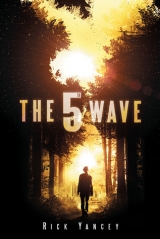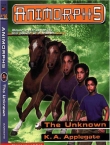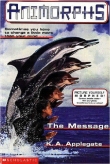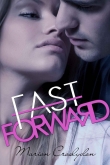
Текст книги "The 5th Wave"
Автор книги: Rick Yancey
Жанры:
Подростковая литература
,сообщить о нарушении
Текущая страница: 7 (всего у книги 27 страниц)


I PICKED OUT Vosch right away.
Standing just inside the door, very tall, the only guy in fatigues not cradling a rifle against his chest.
He nodded to Hutchfield when we stepped inside the old hospital/charnel house. Then Corporal Branch gave a salute and squeezed into the line of soldiers that ringed the walls.
That’s how it was: soldiers standing along three of the four walls, refugees in the middle.
Dad’s hand sought out mine. Sammy’s teddy in one hand, the other hanging on to his.
How about it, Dad? Did that little voice get louder when you saw the men with guns against the walls? Is that why you grabbed my hand?
“All right, now can we get some answers?” someone shouted when we stepped inside.
Everybody started to talk at once—everyone except the soldiers—shouting out questions.
“Have they landed?”
“What do they look like?”
“What are they?”
“What are those gray ships we keep seeing in the sky?”
“When do the rest of us get to leave?”
“How many survivors have you found?”
Vosch held up his hand for quiet. It only half worked.
Hutchfield gave him a smart salute. “All present and accounted for, sir!”
I did a quick head count. “No,” I said. I raised my voice to be heard over the din. “No!” I looked at Dad. “Crisco’s not here.”
Hutchfield frowned. “Who’s Crisco?”
“He’s this cree—this kid—”
“Kid? Then he left on the buses with the others.”
The others. It’s kind of funny when I think about it now. Funny in a sickening way.
“We need everyone in this building,” Vosch said from behind his mask. His voice was very deep, a subterranean rumble.
“He probably had a freakout,” I said. “He’s kind of a wuss.”
“Where would he go?” Vosch asked.
I shook my head. I had no clue. Then I did, more than a clue. I knew where Crisco had gone.
“The ash pit.”
“Where is the ash pit?”
“Cassie,” Dad spoke up. He was squeezing my hand hard. “Why don’t you go get Crisco for us so the colonel can start our briefing?”
“Me?”
I didn’t get it. I think Dad’s little voice was screaming by this point, but I couldn’t hear it, and he couldn’t say it. All he could do was try to telegraph it with his eyes. Maybe it was this: Do you know how to tell who the enemy is, Cassie?
I don’t know why he didn’t volunteer to go with me. Maybe he thought they wouldn’t suspect a kid of anything, and one of us would make it—or at least have a chance to make it.
Maybe.
“All right,” Vosch said. He flicked his finger at Corporal Branch: Go with her.
“She’ll be okay alone,” Dad said. “She knows those woods like the back of her hand. Five minutes, right, Cassie?” He looked at Vosch and smiled. “Five minutes.”
“Don’t be a dumbass, Sullivan,” Hutchfield said. “She can’t go out there without an escort.”
“Sure,” Dad said. “Right. You’re right, of course.”
He leaned over and gave me a hug. Not too tight, not too long. A quick hug. Squeeze. Release. Anything more would seem like a good-bye.
Good-bye, Cassie.
Branch turned to his commander and said, “First priority, sir?”
And Vosch nodded. “First priority.”
We stepped into the bright sunshine, the man in the gas mask and the girl with the teddy bear. Straight ahead a couple of soldiers were leaning against a Humvee. I hadn’t seen them when we passed the Humvees before. They straightened at the sight of us. Corporal Branch gave them a thumbs-up and then held up his index finger. First priority.
“How far is it?” he asked me.
“Not far,” I answered. My voice sounded very small to me. Maybe it was Sammy’s teddy, tugging me back to childhood.
He followed me down the trail that snaked into the dense woods behind the compound, rifle held in front of him, barrel down. The dry ground crunched in protest under his brown boots.
The day was warm, but it was cooler under the trees, their leaves a rich, late-summer green. We passed the tree where I’d stashed the M16. I didn’t look back at it. I kept walking toward the clearing.
And there he was, the little shit, up to his ankles in bones and dust, clawing through the broken remains for that last, useless, priceless trinket, one more for the road so whenever he got to where the road ended he’d be the Man.
His head came around when we stepped inside the ring of trees. Glistening with sweat and the crap he slopped in his hair. Streaks of black soot stained his cheeks. He looked like some sorry-ass excuse of a football player. When he saw us, his hand whipped behind his back. Something silver flashed in the sun.
“Hey! Cassie? Hey, there you are. I came back here looking for you because you weren’t in the barracks, and then I saw…there was this—”
“Is he the one?” the soldier asked me. He slung the rifle over his shoulder and took a step toward the pit.
It was me, the soldier in the middle, and Crisco in the pit of ash and bone.
“Yeah,” I said. “That’s Crisco.”
“That’s not my name,” he squeaked. “My real name is—”
I’ll never know Crisco’s real name.
I didn’t see the gun or hear the report of the soldier’s sidearm. I didn’t see the soldier draw it from his holster, but I wasn’t looking at the soldier, I was looking at Crisco. His head snapped back, like someone had yanked on his greasy locks, and he sort of folded up as he went down, clutching the treasures of the dead in his hand.


MY TURN.
The girl wearing the backpack and carrying the ridiculous teddy bear, standing just a couple of yards behind him.
The soldier pivoted, arm extended. My memory’s a little fuzzy about this next part. I don’t remember dropping the bear or yanking the gun from my back pocket. I don’t even remember pulling the trigger.
The next clear memory I have is of the black visor shattering.
And the soldier falling to his knees in front of me.
And seeing his eyes.
His three eyes.
Well, of course I realized later he didn’t really have three eyes. The one in the middle was the blackened entry wound of the bullet.
It must have shocked him to turn around and see a gun pointed at his face. It made him hesitate. How long? A second? Less than a second? But in that millisecond, eternity coiled on itself like a giant anaconda. If you’ve ever been through a traumatic accident, you know what I’m talking about. How long does a car crash last? Ten seconds? Five? It doesn’t feel that short if you’re in it. It feels like a lifetime.
He pitched over face-first into the dirt. There was no question I’d wasted him. My bullet had blasted a pie plate–sized hole in the back of his head.
But I didn’t lower the gun. I kept it pointed at his half head as I backed toward the trail.
Then I turned and ran like hell.
In the wrong direction.
Toward the compound.
Not smart. But I wasn’t thinking at that point. I’m only sixteen, and this was the first person I’d shot point-blank in the face. I was having trouble dealing.
I just wanted to get back to Dad.
Dad would fix this.
Because that’s what dads do. They fix things.
My mind didn’t register the sounds at first. The woods echoed with the staccato bursts of automatic weapons and people screaming, but it wasn’t computing, like Crisco’s head snapping back and the way he flopped into the gray dust like every bone in his body had suddenly turned into Jell-O, the way his killer had swung around in a perfectly executed pirouette with the barrel of the gun flashing in the sunlight.
The world was ripping apart. And pieces of the wreckage were raining all around me.
It was the beginning of the 4th Wave.
I skittered to a stop before reaching the compound. The hot smell of gunpowder. Wisps of smoke curling out of the barrack windows. There was a person crawling toward the storage shed.
It was my father.
His back was arched. His face was covered in dirt and blood. The ground behind my father was pockmarked with my father’s blood.
He looked over as I came out of the trees.
No, Cassie, he mouthed. Then his arms gave out. He toppled over, lay still.
A soldier emerged from the barracks. He strolled over to my father. Easy, catlike grace, shoulders relaxed, arms loose at his sides.
I backed into the trees. I raised the gun. But I was over a hundred feet away. If I missed…
It was Vosch. He seemed even taller standing over the crumpled form of my father. Dad wasn’t moving. I think he was playing dead.
It didn’t matter.
Vosch shot him anyway.
I don’t remember making any noise when he pulled the trigger. But I must have done something to set off Vosch’s Spidey sense. The black mask whipped around, sunlight flashing off the visor. He held up his index finger toward two soldiers coming out of the barracks, then jabbed his thumb in my direction.
First priority.


THEY TOOK OFF toward me like a couple of cheetahs. That’s how fast they seemed to move. I’d never seen anyone run that fast in my life. The only thing that comes close is a scared-shitless girl who’s just seen her father murdered in the dirt.
Leaf, branch, vine, bramble. The rush of air in my ears. The rapid-fire scuffscuffscuff of my shoes on the trail.
Shards of blue sky through the canopy, blades of sunlight impaling the shattered earth. The ripped-apart world careened.
I slowed as I neared the spot where I’d hidden my father’s last present to me. Mistake. The high-caliber rounds smacked into the tree trunk two inches from my ear. The impact sent fragments of pulverized wood into my face. Tiny, hair-thin slivers embedded themselves in my cheek.
Do you know how to tell who the enemy is, Cassie?
I couldn’t outrun them.
I couldn’t outgun them.
Maybe I could outsmart them.


THEY ENTERED THE CLEARING, and the first thing they saw was the body of Corporal Branch, or whatever it was that called itself Corporal Branch.
“There’s one over there,” I heard one say.
The crunch of heavy boots in a bowlful of brittle bones.
“Dead.”
The cackle of a static frequency, then: “Colonel, we’ve got Branch and one unidentified civilian. That’s a negative, sir. Branch is KIA, repeat Branch is KIA.” Now he spoke to his buddy, the one standing by Crisco. “Vosch wants us back ASAP.”
Crunch-crunch said the bones as he heaved himself out of the pit.
“She ditched this.”
My backpack. I tried to throw it into the woods, as far away from the pit as I could. But it hit a tree and landed just inside the far edge of the clearing.
“Strange,” the voice said.
“It’s okay,” his buddy said. “The Eye will take care of her.”
The Eye?
Their voices faded. The sound of the woods at peace returned. A whisper of wind. The warble of birds. Somewhere in the brush a squirrel fussed.
Still, I didn’t move. Each time the urge to run started to rise up in me, I squashed it down.
No hurry now, Cassie. They’ve done what they’ve come to do. You have to stay here till dark. Don’t move!
So I didn’t. I lay still inside the bed of dust and bones, covered by the ashes of their victims, the Others’ bitter harvest.
And I tried not to think about it.
What I was covered in.
Then I thought, These bones were people, and these people saved my life, and then I didn’t feel so creeped.
They were just people. They didn’t ask to be there any more than I did. But they were there and I was there, so I lay still.
It’s weird, but it was almost like I felt their arms, warm and soft, enfolding me.
I don’t know how long I lay there, with the arms of dead people holding me. It felt like hours. When I finally stood up, the sunlight had aged to a golden sheen and the air had turned a little cooler. I was covered head to toe in gray ash. I must have looked like a Mayan warrior.
The Eye will take care of her.
Was he talking about the drones, an eye-in-the-sky thing? And if he was talking about the drones, then this wasn’t some rogue unit scouring the countryside to waste possible carriers of the 3rd Wave so the unexposed wouldn’t be infected.
That would definitely be bad.
But the alternative would be much, much worse.
I trotted over to my backpack. The deep woods called to me. The more distance I put between myself and them, the better it was gonna be. Then I remembered my father’s gift, far up the path, practically within spitting distance of the compound. Crap, why hadn’t I stashed it in the ash pit?
It sure might prove more useful than a handgun.
I didn’t hear anything. Even the birds had gone mum. Just wind. Its fingers trailed through the mounds of ash, flicking it into the air, where it danced fitfully in the golden light.
They were gone. It was safe.
But I hadn’t heard them leave. Wouldn’t I have heard the roar of the flatbed motor, the growl of the Humvees as they left?
Then I remembered Branch stepping toward Crisco.
Is he the one?
Swinging the rifle behind his shoulder.
The rifle. I crept over to the body. My footfalls sounded like thunder. My own breath like mini explosions.
He had fallen facedown at my feet. Now he was faceup, though that face was still mostly hidden by the gas mask.
His sidearm and rifle were gone. They must have taken them. For a second I didn’t move. And moving was a very good idea at that juncture of the battle.
This wasn’t part of the 3rd Wave. This was something completely different. It was the beginning of the 4th, definitely. And maybe the 4th Wave was a sick version of Close Encounters of the Third Kind. Maybe Branch wasn’t human and that’s why he was wearing a mask.
I knelt beside the dead soldier. Grasped the top of the mask firmly, and pulled until I could see his eyes, very human-looking brown eyes, staring sightlessly into my face. I kept pulling.
Stopped.
I wanted to see and I didn’t want to see. I wanted to know but I didn’t want to know.
Just go. It doesn’t matter, Cassie. Does it matter? No. It doesn’t matter.
Sometimes you say things to your fear—things like It doesn’t matter, the words acting like pats on the head of a hyper dog.
I stood up. No, it really didn’t matter if the soldier had a mouth like a lobster or looked like Justin Bieber’s twin brother.
I grabbed Sammy’s teddy from the dirt and headed for the far side of the clearing.
Something stopped me, though. I didn’t head off into the woods. I didn’t rush off to embrace the one thing with the best chance to save me: distance.
It might have been the teddy bear that did it. When I picked it up, I saw my brother’s face pressed against the back window of the bus, heard his little voice inside my head.
For when you’re scared. But don’t leave him. Don’t forget.
I almost did forget. If I hadn’t walked over to check Branch for weapons, I would have. Branch had fallen practically on top of poor teddy.
Don’t leave him.
I didn’t actually see any bodies back there. Just Dad’s. What if someone had survived those three minutes of eternity in the barracks? They could have been wounded, still alive, left for dead.
Unless I didn’t leave. If there was someone still alive back there and the faux soldiers had gone, then I would be the one leaving them for dead.
Ah, crap.
You know how sometimes you tell yourself that you have a choice, but really you don’t have a choice? Just because there are alternatives doesn’t mean they apply to you.
I turned around and headed back, stepping around the body of Branch as I went, and dove into the dusky tunnel of the trail.


I DIDN’T FORGET the assault rifle the third time around. I shoved the Luger into my belt, but I couldn’t very well expect to fire an assault rifle with a teddy bear in one hand, so I had to leave him on the trail.
“It’s okay. I won’t forget you,” I whispered to Sammy’s bear.
I stepped off the path and wove quietly through the trees. When I got close to the compound, I dropped and crawled the rest of the way to the edge.
Well, that’s why you didn’t hear them leave.
Vosch was talking to a couple of soldiers at the doorway to the storehouse. Another group was messing around by one of the Humvees. I counted seven in all, which left five more I couldn’t see. Were they off in the woods somewhere, looking for me? Dad’s body was gone—maybe the others had pulled disposal duty. There were forty-two of us, not counting the kids who had left on the buses. That’s a lot of disposing.
Turns out I was right: It was a disposal operation.
It’s just that Silencers don’t dispose of bodies the way we do.
Vosch had taken off his mask. So had the two guys who were with him. They didn’t have lobster mouths or tentacles growing out of their chins. They looked like perfectly ordinary human beings, at least from a distance.
They didn’t need the masks anymore. Why not? The masks must have been part of the act. We would expect them to protect themselves from infection.
Two of the soldiers came over from the Humvee carrying what looked like a bowl or globe the same dull gray metallic color as the drones. Vosch pointed at a spot midway between the storehouse and the barracks, the same spot, it looked like, where my father had fallen.
Then everybody left, except one female soldier, who was kneeling now beside the gray globe.
The Humvees roared to life. Another engine joined the duet: the flatbed troop carrier, parked at the head of the compound out of sight. I’d forgotten about that. The rest of the soldiers must have already loaded up and were waiting. Waiting for what?
The remaining soldier stood up and trotted back to the Humvee. I watched him climb aboard. Watched the Humvee spin out in a boiling cloud of dust. Watched the dust swirl and settle. The stillness of summer at dusk settled with it. The silence pounded in my ears.
And then the gray globe began to glow.
That was a good thing, a bad thing, or a thing that was neither good nor bad, but whatever it was, good, bad, or neither, depended on your point of view.
They had put the globe there, so to them it was a good thing.
The glow was getting brighter. A sickly yellowish green. Pulsing slightly. Like a…A what? A beacon?
I peered into the darkening sky. The first stars had begun to come out. I didn’t see any drones.
If it was a good thing from their point of view, that meant it was probably a bad thing from mine.
Well, not probably. Leaning more toward definitely.
The interval between pulses shortened every few seconds. The pulse became a flash. The flash became a blink.
Pulse…Pulse…Pulse…
Flash, flash, flash.
Blinkblinkblink.
In the gloom, the globe reminded me of an eye, a pale greenish-yellow eyeball winking at me.
The Eye will take care of her.
My memory has preserved what happened next as a series of snapshots, like freeze-frame stills from an art house movie, with those jerky, handheld camera angles.
SHOT 1: On my butt, doing a crab-crawl away from the compound.
SHOT 2: On my feet. Running. The foliage a blur of green and brown and mossy gray.
SHOT 3: Sammy’s bear. The chewed-up little arm gummed and gnawed since he was a baby slipping from my fingers.
SHOT 4: Me on my second attempt to pick up that damned bear.
SHOT 5: The ash pit in the foreground. I’m halfway between Crisco’s body and Branch’s. Clutching Sammy’s bear to my chest.
SHOTS 6–10: More woods, more me running. If you look closely, you can see the ravine in the left-hand corner of the tenth frame.
SHOT 11: The final frame. I’m suspended in midair above the shadow-filled ravine, taken right after I launched myself off the edge.
The green wave roared over my curled-up body at the bottom, carrying along tons of debris, a rocketing mass of trees, dirt, the bodies of birds and squirrels and woodchucks and insects, the contents of the ash pit, shards of the pulverized barracks and storehouse—plywood, concrete, nails, tin—and the first couple of inches of soil in a hundred-yard radius of the blast. I felt the shock wave before I hit the muddy bottom of the ravine. An intense, bone-rattling pressure over every inch of my body. My eardrums popped, and I remembered Crisco saying, You know what happens when you’re blasted with two hundred decibels?
No, Crisco, I don’t.
But I’ve got an idea.


I CAN’T STOP thinking about the soldier behind the coolers and the crucifix in his hand. The soldier and the crucifix. I’m thinking maybe that’s why I pulled the trigger. Not because I thought the crucifix was another gun. I pulled the trigger because he was a soldier, or at least he was dressed like a soldier.
He wasn’t Branch or Vosch or any of the soldiers I saw that day my father died.
He wasn’t and he was.
Not any of them, and all of them.
Not my fault. That’s what I tell myself. It’s their fault. They’re the ones, not me, I tell the dead soldier. You want to blame somebody, blame the Others, and get off my back.
Run = die. Stay = die. Sort of the theme of this party.
Beneath the Buick, I slipped into a warm and dreamy twilight. My makeshift tourniquet had stopped most of the bleeding, but the wound throbbed with each slowing beat of my heart.
It’s not so bad, I remember thinking. This whole dying thing isn’t so bad at all.
And then I saw Sammy’s face pressed against the back window of the yellow school bus. He was smiling. He was happy. He felt safe surrounded by those other kids, and besides, the soldiers were there now, the soldiers would protect him and take care of him and make sure everything was okay.
It had been bugging me for weeks. Keeping me up at night. Hitting me when I least expected it, when I was reading or foraging or just lying in my little tent in the woods thinking about my life before the Others came.
What was the point?
Why did they play that giant charade of soldiers arriving in the nick of time to save us? The gas masks, the uniforms, the “briefing” in the barracks. What was the point to all that when they could have just dropped one of their blinky eyeballs from a drone and blown us all to hell?
On that cold autumn day while I lay bleeding to death beneath the Buick, the answer hit me. Hit me harder than the bullet that had just torn through my leg.
Sammy.
They wanted Sammy. No, not just Sammy. They wanted all the kids. And to get the kids, they had to make us trust them. Make the humans trust us, get the kids, and then we blow them all to hell.
But why bother saving the children? Billions had died in the first three waves; it wasn’t like the Others had a soft spot for kids. Why did the Others take Sammy?
I raised my head without thinking and whacked it into the Buick’s undercarriage. I barely noticed.
I didn’t know if Sammy was alive. For all I knew, I was the last person on Earth. But I had made a promise.
The cool asphalt scraping against my back.
The warm sun on my cold cheek.
My numb fingers clawing at the door handle, using it to pull my sorry, self-pitying butt off the ground.
I can’t put any weight on my wounded leg. I lean against the car for a second, then push myself upright. On one leg, but upright.
I might be wrong about them wanting to keep Sammy alive. I’d been wrong about practically everything since the Arrival. I still could be the last human being on Earth.
I might be—no, I probably am—doomed.
But if I’m it, the last of my kind, the last page of human history, like hell I’m going to let the story end this way.
I may be the last one, but I am the one still standing. I am the one turning to face the faceless hunter in the woods on an abandoned highway. I am the one not running, not staying, but facing.
Because if I am the last one, then I am humanity.
And if this is humanity’s last war, then I am the battlefield.








